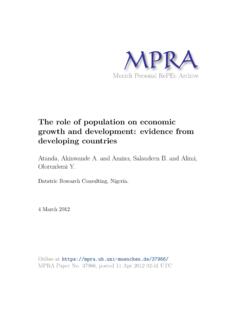Transcription of The Role of Cooperative Societies in Economic Development
1 Munich Personal RePEc ArchiveThe Role of Cooperative Societies inEconomic DevelopmentAhmad Bello, DogarawaAhmadu Bello University, Zaria-Nigeria2005 Online Paper No. 23161, posted 09 Jun 2010 03:12 UTCThe Role of Cooperative Societies in Economic Development Abstract This paper examines the role of Cooperative Societies in Economic Development . The aim is to investigate the ways in which cooperatives can act as agents towards sustainable community Development . The paper is a descriptive survey, which involves the collection of data for the purpose of describing the role of Cooperative Societies in Economic Development .
2 The paper posits that for over 160 years now cooperatives have been an effective way for people to exert control over their Economic livelihoods as they play an increasingly important role in facilitating job creation, Economic growth and social Development . The paper concludes that to be effective and successful, cooperatives must continuously achieve two inter-related goals: enhance viability and improve ability to service its members; and remain an economically viable, innovative and competitive enterprise.
3 Introduction1 Today, in an era when many people feel powerless to change their lives, cooperatives represent a strong, vibrant, and viable Economic alternative. Cooperatives are formed to meet peoples mutual needs. They are based on the powerful idea that together, a group of people can achieve goals that none of them could achieve alone. For over 160 years now, cooperatives have been an effective way for people to exert control over their Economic livelihoods. They provide a unique tool for achieving one or more Economic goals in an increasingly competitive global economy.
4 As governments around the world cut services and withdraw from regulating markets, cooperatives are being considered useful mechanisms to manage risk for members in Agricultural or other similar cooperatives, help salary/wage earners save for the future through a soft-felt monthly contribution that is deducted from source, own what might be difficult for individuals to own by their efforts, strengthen the communities in which they operate through job provision and payment of local taxes.
5 Cooperatives generally provide an Economic boost to the community as well. Incidentally, Cooperative despite its old age is not very popular in Nigeria. Only recently worker cooperatives started gaining ground among working class citizens, most of who find it difficult to save part of their salaries/wages for the rainy day. Hitherto, Cooperative Societies were thought to be associations meant only for farmers, small traders and other very low-income earners. This explains why quite a number of Cooperative farmers are found, particularly in southern Nigeria 1 This Paper has been published in the official journal of the Department of Public Administration, Ahmadu Bello University, Zaria-Nigeria Ahmad Bello Dogarawa, Department of Accounting, Ahmadu Bello University, Zaria 1 The Role of Cooperative Societies in Economic Development The problem is that many people do not know much about Cooperative .
6 Its mechanisms and role in Economic Development , and how it is considered in the world as a Third Force, an alternative and countervailing power to both big business and big government. Against this background, this paper examines the role of Cooperative Societies in Economic Development with a view to throwing some light on the nature and features of cooperatives, the benefits and the formation and management of Cooperative Societies . The paper investigates the ways in which cooperatives can act as agents towards sustainable community Development .
7 The justification of the study precipitates from the fact that although investigating the role of cooperatives on the international scale is not a new phenomenon, in Nigeria, results of such researches are still scanty and incomprehensive. The paper is a descriptive survey, which involves the collection of data for the purpose of describing the role of Cooperative Societies in Economic Development . The remainder of the paper is organised as follows. Section two gives a background on cooperatives, which serves as the theoretical framework.
8 Section three assesses the role and mechanism of Cooperative Societies . Section four highlights the steps involved in starting a Cooperative . Section five discusses the challenges facing cooperatives and section six summarises and concludes the paper. Background on Cooperatives The International Cooperative Alliance (ICA) in its Statement on the Cooperate Identity, in 1995, defines a Cooperative as an autonomous association of persons united voluntarily to meet their common Economic , social, and cultural needs and aspirations through a jointly-owned and democratically-controlled enterprise.
9 It is a business voluntarily owned and controlled by its member patrons and operated for them and by them on a nonprofit or cost basis (UWCC, 2002). It is a business enterprise that aims at complete identity of the component factors of ownership, control and use of service, three distinct features that differentiate cooperatives from other businesses (Laidlaw, 1974). Ahmad Bello Dogarawa, Department of Accounting, Ahmadu Bello University, Zaria 2 The Role of Cooperative Societies in Economic Development Although there is no consistency to the exact origin of the co-operative movement, many academics argue the origins lie within Europe (Shaffer, 1999; Holyoake, 1908).
10 The first recorded co-operatives date back to 1750 in France, where local cheese makers in the community of Franche-Comt established a producer cheese co-operative. Within the decade, co-operatives had developed in France, United Kingdom, United States and Greece. In 1844 the Equitable Pioneers of Rochdale Society (EPRS) was formed. With the goal of social improvement, twenty-eight unemployed community members saw the opportunity to pool their limited resources and attempt cooperation for the good of the group.


















